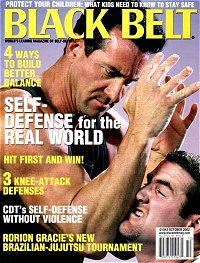Outside the school gym, two men sat idly on a bench, waiting for Tai Chi class to begin. “If anyone were to attack me,” the first student offered, “I would simply run away, living to fight another day.”
A faint smile crossed his companion’s face, as both continued to enjoy the summer sunset. Allowing a respectful pause, the second man finally replied: “And how fast can you run?”
While it is true that a fight requires two consenting parties, a brutal beating does not. There are times when strategic retreat is not an option. We all know that martial arts experience is valuable in such times, for everyone.
But did you know that martial arts training offers special benefits for the kind and gentle?
